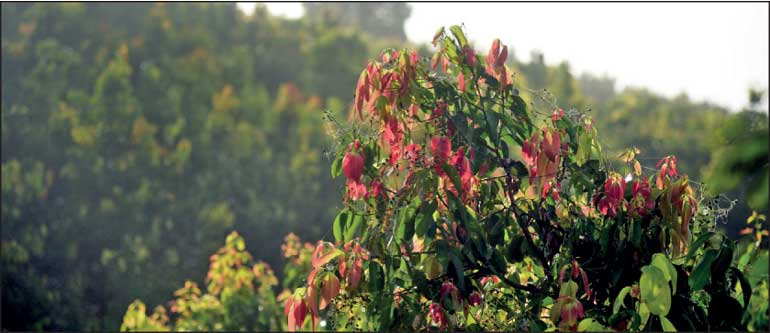Monday Apr 07, 2025
Monday Apr 07, 2025
Wednesday, 8 May 2024 00:16 - - {{hitsCtrl.values.hits}}

Cinnamon at Kahawatte Plantations
 Everything needs to have a reason, framed in its purpose. Without reason and purpose, life and everything that is part of living decays into meaninglessness. Mark Twain brilliantly explained, “The two most important days in life are the day you were born and the day you find out why.” That truth applies as much to life as to business. There was a time – when it was thought private enterprise – businesses pursuing their own interests – would contribute to a better outcome for society as a whole. It was thought that individuals in pursuit of profit would inadvertently contribute to the economic well-being of society as a whole.
Everything needs to have a reason, framed in its purpose. Without reason and purpose, life and everything that is part of living decays into meaninglessness. Mark Twain brilliantly explained, “The two most important days in life are the day you were born and the day you find out why.” That truth applies as much to life as to business. There was a time – when it was thought private enterprise – businesses pursuing their own interests – would contribute to a better outcome for society as a whole. It was thought that individuals in pursuit of profit would inadvertently contribute to the economic well-being of society as a whole.
It didn’t work out like that. Two brilliant academics on two different sides of the Atlantic Ocean, explained that Adam Smith’s ‘invisible hand’ and Friedman’s notion of prosperity through growth, had no relevance in reality. Canadian Law Professor Joel Bakan and British Professor of Economics Mariana Mazzucato corrected that misconception, reframing theory with consideration of a natural part of the human condition that their predecessors had failed to see; greed, which – left unchecked – only fuels the crises of inequality, climate, health and conflict that are part of our lives today.
That is important context to the story of Ceylon Cinnamon...
Ceylon Cinnamon has no equal; a spice with provenance that other herbs, spices and gourmet ingredients can only fantasise about, its recorded history begins in 2800BC. Cinnamon is mentioned in the Holy Bible. In ancient Roman times our Cinnamon was a prized and alluring luxury, as valuable as gold, silver and precious gemstones. Ancient Egyptians and Greeks were no different in their appreciation of Cinnamon from Taprobane (now Sri Lanka), and considered the spice so precious that it was equal in value to gold and ivory, offered to pharoahs and gods.
King Solomon, at the time (970-931 BC) considered richer and wiser than any other ruler, counted cinnamon amongst his treasures and regularly dispatched his fleet to Tarshish (present day Galle, Sri Lanka) for fresh supplies. Cinnamon was treasured for its fragrance, loved for its taste, prized for its rarity and desired for its mystery. The allure of Ceylon Cinnamon triggered great oceanic expeditions, wars, conquests and fuelled a global trade in the precious spice.
Much has changed since then, not in the qualities of Ceylon Cinnamon, but in the manner in which Cinnamon is traded. Cinnamon has become a victim of its own success, diminished in the hands of global spice traders and brands motivated solely by profit and the pursuit of market dominance, but diminished also by the compliance of the Cinnamon industry in Sri Lanka.
As Mazzucato explains, price does not equate to value, and while Cinnamon is a spice that attracts a high price relative to other spices, true value – value creation – is very different to value extraction. It is the difference between sustainable growth – an industry with a foundation – and extraction – industry that lacks resilience, and is vulnerable to the multitude of climate, social and other crises that we encounter with alarming regularity today.
Terribly compromised
Behind the artisanship and craft without which Ceylon Cinnamon would be much less valuable, should exist an ecosystem of regenerative agricultural practices, thriving communities with good access to education, nutrition, healthcare, an industry driven by innovation and a promising future. But that’s not how it is. The extraordinary spice with its ancient lineage, has been terribly compromised.
It’s not only Cinnamon that struggles with this reality though. There is a vicious circle that has produced poverty at the centre of many great, agricultural endeavours. 44% of the world’s coffee farmers are estimated to live below the poverty line. Chocolate makers globally face the prospect of a lack of cocoa as years of unfair pricing sometimes even shrouded in superficial ‘ethical’ certification, has compromised the innovation, sustainability and livelihoods that should have formed a cocoa industry with greater resilience to climate change and linked diseases. As William Dalrymple writes in his globally acclaimed book, ‘Anarchy’, colonialism was a form of corporate violence, a means of ruthlessly extracting wealth in the form of precious gemstones, tea, cinnamon and taxes. That process was managed by the British East India Company, and its Dutch equivalent – VOC – before that. The culpability of the Sri Lankan Cinnamon industry is in allowing that exploitation to continue post Independence (in 1948), with the British Empire replaced by the more benign yet equally economically and socially devastating global corporations.
Science has added deeper insight into Cinnamon, evidencing the uniqueness of Ceylon Cinnamon and offering evidence that our Cinnamon possesses formidable human health benefits. The efficacy of Ceylon Cinnamon against cancers, diabetes, heart disease and dementia has been proven beyond doubt in human studies. Ceylon Cinnamon is an unquestionably great spice, yet in this 21st Century can any industry be referred to as great unless it is genuinely valuable in the broader, social and environmental sense, as well as the narrower measure of price, taste and wellness.
The erosion of the value of Ceylon Cinnamon began with the attempt at competing with a vastly inferior substitute. Selling anything on price is always the refuge of traders without imagination or humanity. Ceylon Cinnamon is a valuable spice, and for that value to translate into purpose –touching the lives of the community and environment that make it possible, its story must be told, supporting the justifiably premium quality and price positioning. Yet on grocery shelves Ceylon Cinnamon stands alongside cassia, most often with no explanation, destined to erode the unmatched heritage while only delivering short term profit to traders.
Harvesting, preparing, peeling and quilling Cinnamon is a demanding and arduous task. It requires skill, experience and dedication. While this tradition continues to deliver exceptional Cinnamon, with the same assurance of uniqueness, craftsmanship, sophistication and goodness that ancient Egyptians, Greeks and Romans so highly valued, there is no justification for externalising the artisans that make Cinnamon great because of the myopic perspective of the people who should lead their industry.
The only Ceylon Cinnamon available on Amazon’s global marketplace is from non-Sri Lankan brands. It is the same at La Grande Epicerie de Paris where most fine food and ingredients from around the world is available. There is no Ceylon Cinnamon among the generic cinnamon and cassia products at Waitrose, Tesco or Sainsbury in the UK and in Coles and Woolworths stores in Australia. The reputation, wellness, taste and heritage of Ceylon Cinnamon that we now read of in history and science has benefitted traders and foreign brands unfairly, at the cost of the foundation on which the livelihood of our Cinnamon growers and the reputation and future of our Cinnamon industry should have been constructed.
Absence of effective regulatory mechanism
We can’t expect anything different from traders. They exist to source their product as cheaply as possible, mix good and inferior cinnamon when they can get away with it, and supply importers and brand owners in competition to the inferior and toxic substitute, cassia. It gets worse because the absence of an effective regulatory mechanism means that product labelled Ceylon Cinnamon is often not, and even if it is, will definitely not deliver fair benefit to Cinnamon growers. The ongoing Ceylon Cinnamon GI process offers light at the end of a very long tunnel.
True value implies social value; education for the children of artisans, nutrition, welfare for the elderly. Natural value means the raft of actions required to build climate resilience, conserve biodiversity and preserve soils, environment and ecosystem services for future generations. There are costs in each case but they are beyond the pricing mechanism that governs the industry. For every industry, the creation of true value and benefit for people and nature is morally, ethically, economically, socially, and practically, right. Anything less degrades the ecosystem services that are needed to deliver the Cinnamon, Tea, food & economic security that are central to our existence. It also fuels inequality and compromises the future of our industry and community. Ultimately it can lead to the destruction of the industry itself, as we are seeing today in cocoa.
Abdicating this responsibility to create natural and social value and protect our people and environment is likely to create unimaginable hardship for present and future generations. From an economic perspective, doing so destabilises markets, drives inequality, unsustainable migration, gender and other imbalance and eventually collapse of the rural economy and its potential. To risk all that while in our hands we hold something as precious as the original, finest and most valuable Cinnamon in the world would be a tragedy.
An industry cannot be acknowledged for its greatness if it does not serve a purpose that includes the welfare of the people and the natural environmental that contribute to its greatness. Failure to do that would be exploitative and foolish; just as the most magnificent tree cannot withstand the lightest of storms without its roots, anchoring and nurturing every industry with a robust social and environmental foundation is critical. In this 21st Century it becomes vastly more critical as a buffer to the climate, social, political and myriad other storms that are only growing in their ferocity and regularity.
To be continued.
Discover Kapruka, the leading online shopping platform in Sri Lanka, where you can conveniently send Gifts and Flowers to your loved ones for any event including Valentine ’s Day. Explore a wide range of popular Shopping Categories on Kapruka, including Toys, Groceries, Electronics, Birthday Cakes, Fruits, Chocolates, Flower Bouquets, Clothing, Watches, Lingerie, Gift Sets and Jewellery. Also if you’re interested in selling with Kapruka, Partner Central by Kapruka is the best solution to start with. Moreover, through Kapruka Global Shop, you can also enjoy the convenience of purchasing products from renowned platforms like Amazon and eBay and have them delivered to Sri Lanka.
Discover Kapruka, the leading online shopping platform in Sri Lanka, where you can conveniently send Gifts and Flowers to your loved ones for any event including Valentine ’s Day. Explore a wide range of popular Shopping Categories on Kapruka, including Toys, Groceries, Electronics, Birthday Cakes, Fruits, Chocolates, Flower Bouquets, Clothing, Watches, Lingerie, Gift Sets and Jewellery. Also if you’re interested in selling with Kapruka, Partner Central by Kapruka is the best solution to start with. Moreover, through Kapruka Global Shop, you can also enjoy the convenience of purchasing products from renowned platforms like Amazon and eBay and have them delivered to Sri Lanka.